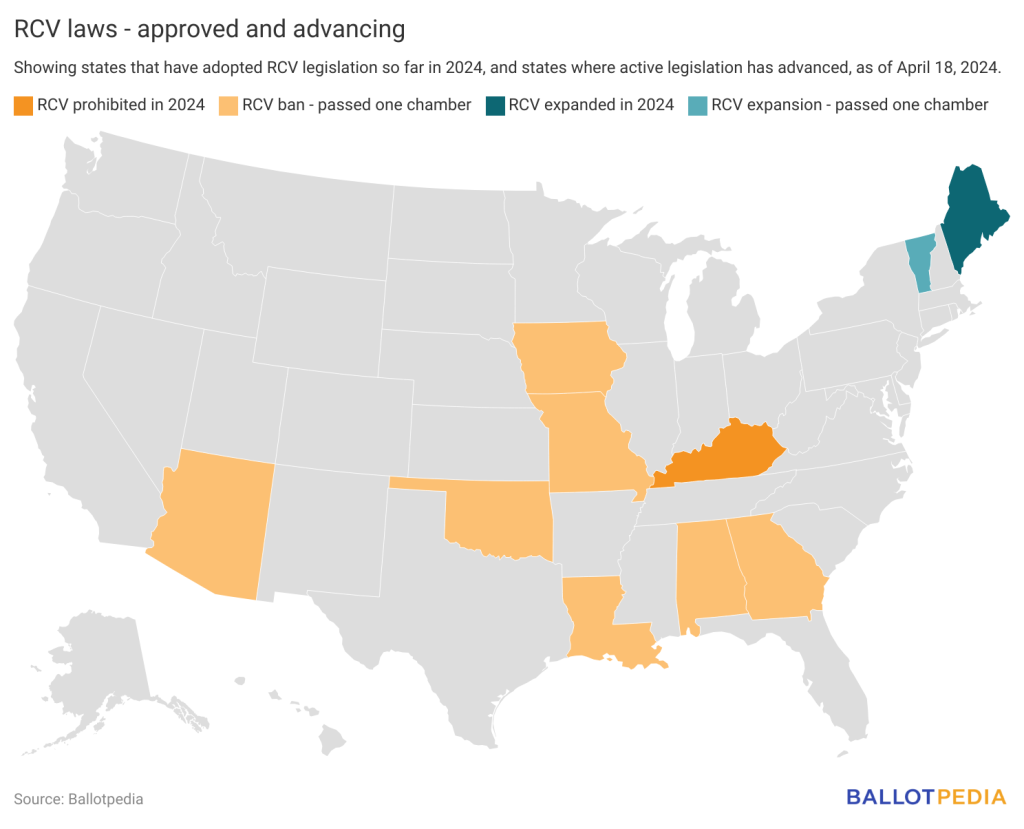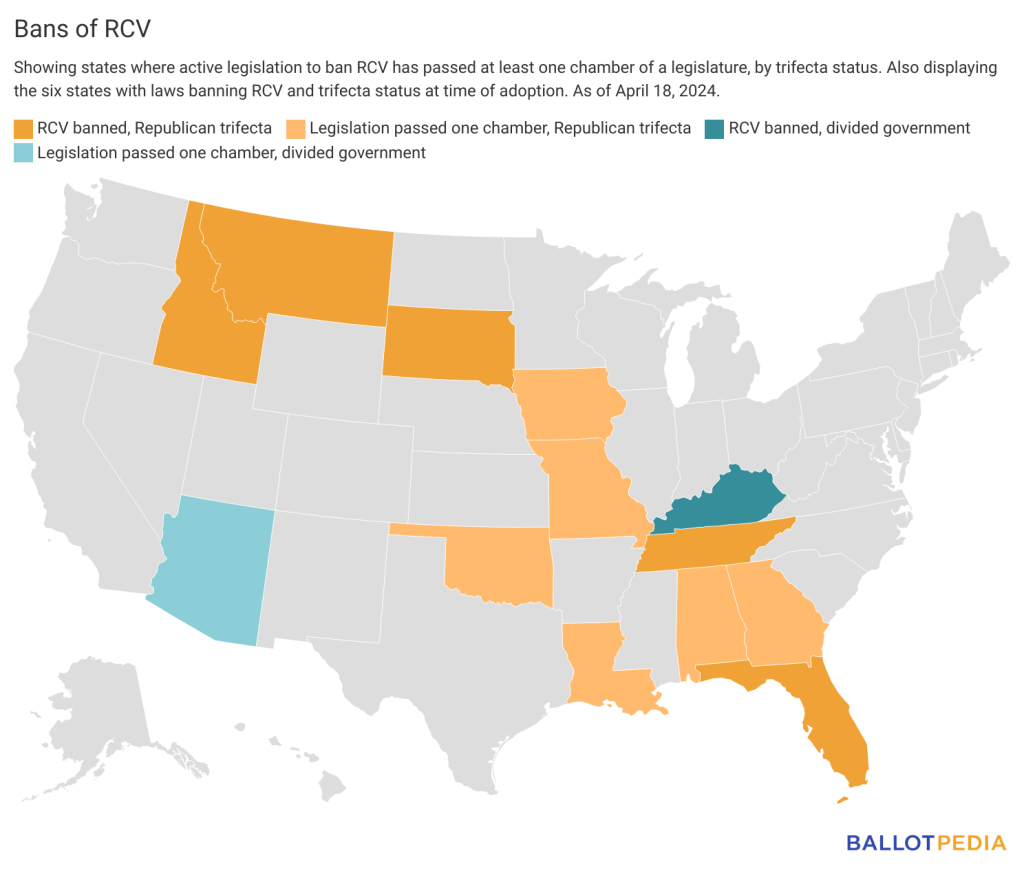Two states adopted new ranked-choice voting (RCV) laws in recent weeks. Elsewhere, RCV legislation advanced in Republican trifecta states and was vetoed in Virginia. Check out April’s RCV update below.

Kentucky is sixth state to ban RCV
On April 12, Kentucky legislators overrode Gov. Andy Beshear’s (D) veto of House Bill 44 (HB 44), which prohibits ranked-choice voting (RCV). The bill changes several areas of election law, mostly related to voter list maintenance. Legislators added the portion of the bill that bans RCV as a Senate amendment, prohibiting the use of RCV for local, state, and federal elected offices.
The final version of HB 44 passed the Kentucky Senate 28-8 on March 27. All Democrats in the chamber voted “No,” and all but one Republican present voted “Yes.” It passed the Kentucky House 75-18 the next day with all but one Democrat voting “No,” and every Republican in the chamber voting “Yes.”
Beshear vetoed the legislation on April 5. He did not mention the bill’s RCV prohibition in his veto message.
Lawmakers overrode the veto on April 12, voting 79-20 in the lower chamber and 24-8 in the upper chamber. Kentucky law requires a simple majority in both chambers to override a veto. Kentucky is one of four states where one party has a veto-proof majority in the legislature but a governor from the opposite party.
The new law makes Kentucky the sixth state to ban RCV. Kentucky is the first state to adopt such a law with a divided government. The other five states had Republican trifectas when they banned RCV.
Maine joins the NPVIC and conditionally establishes RCV for presidential elections
In Maine, Legislative Document 1578 (LD 1578) became law on April 16 after Gov. Janet Mills left the bill unsigned. The legislation makes Maine the 17th state to join the National Popular Vote Interstate Compact (NPVIC) and conditionally establishes the use of RCV for presidential elections if the compact comes into effect.
It passed the Maine House of Representatives 73-72 on April 2, with all Republicans in the chamber, joined by five Democrats, voting against passage. It passed the state Senate 18-12 the next day, with one Republican joining the bulk of the chambers’ Democrats in voting for passage.
The NPVIC is an interstate compact in which states agree to award member states’ presidential electors to the candidate that receives the most votes nationwide. The NPVIC would go into effect if states representing at least 270 electoral college votes adopt legislation committing them to the compact. With Maine’s ascension, members of the compact now represent 209 Electoral College votes from 17 states and D.C.
The new law requires that RCV be used for any future presidential election with the compact’s agreement in force. Maine is one of two states, with Alaska, that use RCV for some regular statewide and congressional elections. Fifteen other states use RCV for some elections.
Missouri voters may decide amendment to prohibit RCV
On April 15, the Missouri House of Representatives passed a legislatively referred constitutional amendment (LRCA) to make election and voting-related changes to the state constitution, including prohibiting RCV and noncitizen voting. If the Senate passes the resolution, it will go on the Nov. 5 ballot. Missouri is a Republican trifecta.
House Joint Resolution 104 (HJR 104) passed the House 102-44. All 102 “Yes” votes were from Republicans, and all 44 “No” votes were from Democrats. HJR 104 would restrict voting to U.S. citizens, prohibit RCV, and require partisan primaries and a plurality voting system. It would also require that voting machines be tested and certified as meeting federal security standards before each election. The amendment would also allow paper ballots to be used alongside any other mechanical voting method.
The bill’s sponsor, Rep. Ben Baker (R), said, “Like many other initiative petitions in recent years, the RCV idea has often been funded by deep pockets outside of our state, and this particular idea is really just a new scheme to get more Democrats elected in red states like Missouri. This measure comes as a response to the growing concerns about the potential impact of RCV on voter confidence, election integrity, and the efficiency of the electoral process.”
The Missouri Voter Protection Coalition submitted testimony opposing HJR 104, saying, “This is duplicative and unnecessary—given that only citizens are eligible to vote—and designed to confuse voters. … The proposed resolution would further undermine the voices of Missourians by prohibiting their ability to consider alternative forms of voting such as ranked choice or approval voting …”
The Missouri Senate also approved a constitutional amendment (SJR 78) to ban noncitizen and RCV voting.
Governor Youngkin vetoes RCV cleanup bill in Virginia
On April 8, Gov. Glenn Youngkin (R) vetoed Senate Bill 428 (SB 428), a bill to clarify rules and standards for RCV elections in the state.
The final version of the legislation passed the Virginia House of Delegates 54-44 on March 6, with four Republicans joining all of the chamber’s Democrats in voting “Yes.” It passed the state Senate 21-19 along partisan lines the next day.
Virginia currently allows RCV county supervisor and city council races, and RCV is currently in use in Arlington County.
In his veto, Youngkin said, “Concerns have been raised about its use in general elections where some voters have found it confusing. … A heightened risk of mistakenly erroneous ballot submissions raises concerns about disenfranchisement and an increased lack of voter confidence in election results.”
The bill’s sponsor, Sen. Schuyler VanValkenburg (D), questioned the justification for the veto, saying, “The bill made a series of changes the Department (of Elections) asked for to ensure for a smoother and more legally sound process for ranked-choice voting. This bill was about sound governance. By vetoing the bill the Governor repudiated his own department and its report and failed to make the legal changes that would make our elections more sound.”
Two RCV prohibitions advance in Republican trifecta states
In addition to HJR 104 in Missouri, legislation banning RCV advanced in two other Republican trifecta states in April.
In Alabama, Senate Bill 186 (SB 186) passed the state Senate by a voice vote on April 9 and was reported out of the House Constitution, Campaigns and Elections Committee on April 17th. The bill makes an exception for military and overseas absentee voters. In six states, including Alabama, military and overseas voters use ranked ballots for runoff elections.
In Oklahoma, House Bill 3156 (HB 3156) passed the lower chamber 63-16 on March 13, with all Democrats and one Republican voting “No.” Members reported it out of the Senate General Government Committee with a favorable recommendation on April 11.
Florida and Tennessee were the first states to ban RCV, doing so in 2022. Idaho, Montana, and South Dakota banned RCV last year. Active legislation in 20 other states would ban RCV, including bills in seven states (Alabama, Arizona, Georgia, Iowa, Louisiana, Missouri, and Oklahoma) that have passed one chamber. Republicans control the legislature in each of these seven states.








